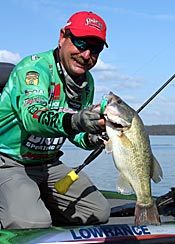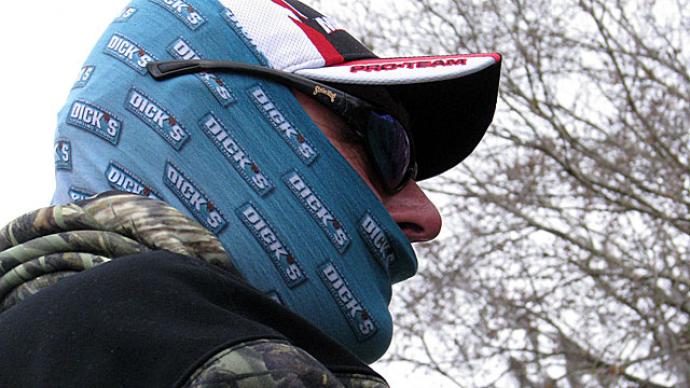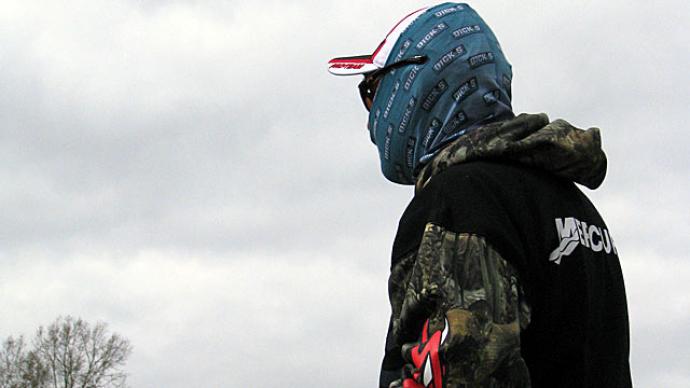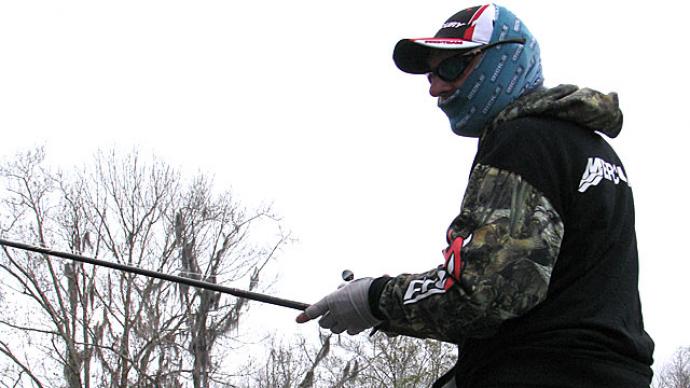
Keri May, co-owner of BassResource.com, spent a day on the water with Shaw Grigsby posing questions that members from our forums submitted for Shaw to answer. Here is part 9 of a nine-part series where Shaw answers every single one of them! In this episode, Shaw talks about his show and the Bassmaster Classic!
Keri: So your show One More Cast.
Shaw Grigsby: Fifteen years.
Keri: That's a long time. How do you choose your programming?
Shaw: I wing it.
Keri: Do you?
Shaw: This year was budget cuts, budget cuts, budget cuts. We filmed a lot locally in Florida and stuff like that. We did travel a little, but we tried not to. I went to Venice, down here, to redfish, and had a blast. It doesn't get better than throwing a buzzbait and having a big old redfish come up and crush it. I do eight fresh and five saltwater, and I just wing it. Like that guy said today, you need to try this lake in April. Somebody like that tells me about it, and I often end up showing up on him.
I ran into a guy at Dick's Sporting Goods. He comes in to look for some hunting stuff and ran into me, and he says, man, I've seen you on TV, and we start shooting the breeze. He's a big trout fisherman, and when I say big trout fisherman, I mean he wins all the trout deals with big fish. He's a big fish trout fisherman and loves it. That's his passion. He does stuff really special and unique.
I said yeah, that would make an incredible show. Who knows? I gave him my card, and we may hook up and do a show here catching sea trout, speckled trout out there in New Orleans.
You never know. We may not. I never know if I will be in business the next year as bad as the economic times and the sponsorship.
Keri: Do you produce this show by yourself, then?
Shaw: There's a guy, Woody Blackburn, Ironwood Productions, and that's the production company. He generally handles the business side, and I handle the fishing side. We can figure things out. I'm generally in charge of all the fishing, and he's in charge of the business. Not really. I'm in charge of a lot of business too. I also get to do the business. He handles the business.
Keri: Most of your shows then are shot, like you said, in the off-season, September, October?
Shaw: I used to start in May. We always have a few weeks in May, and I used to start in May. It seems harder and harder to get commitments from sponsors, and you hate to turn around and film a show, and then the sponsors say no, we're not sponsoring you, which we've had happen. Suddenly, you've got six shows done, half your season, and they're not sponsoring you, and they're not paying you a dime for it. You really need to get your commitments wrapped up, and they seem to be later and later every year before they'll commit. That makes it later and later before you can really be assured. I'd like to have two-year and three-year agreements, which have gone by the wayside, so you're up to one-year deals and just hoping everything goes well.
Keri: Do you see the economy turn around?
Shaw: Not yet.
Keri: Not yet.
Shaw: It is slightly, and we know that, but there's always going to be a considerable lag, and I may be wrong, it may be 5 or 10 before it comes back to what it was, and we may not see it come back to what it was for years. There was a lot of extravagant spending and deals when times were really good. People are gun-shy now.
Keri: So the Classic used to be in August, I believe?
Shaw: July.
Keri: July.
Shaw: July, the end of July, first of August, so it was always summertime.
Keri: Did you prefer that?
Shaw: I did for one reason. I liked that the kids could get out of school or be out of school, and the family could take a summer vacation and come. We had a lot of families come to it. You still have people. You're going to have a lot of people here. Shreveport was incredible. Here it was February, and it was arm-to-arm, shoulder-to-shoulder, walking the aisles. There were thousands of people. I don't know how many.
Shreveport was an excellent Classic, and last year in Alabama was an okay Classic numbers-wise. It didn't compete with Shreveport. Shreveport was incredible. That was what all of them were when we had them in the summertime. When they had them in Florida, it was huge. It limits where you can go when you this time of year.
It scares me because I'm not a good fall fisherman, and some people absolutely love the fall.
I tolerate it, and I do okay. I've had some good finishes in the fall. I've never won in the fall that I know of. I won the Red Man All-American in the fall, but that was in Florida. I won the Florida tournament. I've won some seconds and thirds so I can compete.
I was happy to see that go away, and I didn't have to compete in the fall. I could do it in the spring and summer, and I really thought that we would have several Classics like in Florida.
We had one, and I didn't qualify that year, and it broke my heart and crushed me. I was right there and didn't get it done. So I didn't get to fish it in my home state, in my home body of water where I catch them better than anything, where I've won just gazillions of dollars, and I didn't get to do it. Oh well.
Keri: Well, they'll have more there, I'm sure.
Shaw: I don't know. They've got one more year, which is this year at Red River. That's your last one, and I'll guarantee it will not be in the winter again.
Keri: Do you think they're going to change it back or push it out maybe a month or two?
Shaw: You don't know. It could end up being a fall tournament.
Keri: Oh really?
Shaw: But I think if you're looking at being fan-friendly, you'd go back to summertime. Kids are out of school, and people generally take summertime vacations. You'll probably get more people showing up for it.
They were concerned about different sports and all that. Heck, in the summertime, what's going on? You don't have any football. Basketball is over. You got some baseball, but baseball goes on all year, but who cares until October when it comes to playoffs, so it's like you're not competing with anything. There's the Tour de France in whenever it is, August or July or something like that, and that's it. So what are you competing with? Nothing.
I don't see a negative; I see all positive.
The other thing is it does open up to the guys that are really good deep water structure, and it opens it up to the guys that are flippers and pitchers so that those guys will love it again. Then all of a sudden, it opens up the whole country. Now you can go to Michigan and have a Classic. Now you can go to New York and have a Classic. Now we can go anywhere in the country that wants us in the summertime.
You can't do that in February. I don't care what you do. It's just not good.
Even if ESPN had kept it, that had to be short-lived, the decision to have it in February. My deal was that I couldn't believe that we had it in February all these years now, four years or five or whatever, and one in Florida.
Keri: That amazes me too.
Shaw: One in a southern area where you could catch giant fish.
Keri: Spawning.
Shaw: Yeah. It doesn't even need to be spawning. It could've been in San Antonio and fish Choke, an hour south, and driven back and forth and caught giant fish and still been nice and warm. Even if it gets cold, it's not that bad. But no, we're fishing in the frozen tundra of Shreveport and northern Alabama. It will be six years of cold frigid, potentially cold and frigid; this is not cold and frigid. This is absolutely wonderful.
Keri: So if they put the Classic back in the summer, what would that do to your TV scheduling, or would they move the other tournaments around?
Shaw: I wouldn't know what they'd do. We're done right now. What you like is that we're done in June. Being done in June means you can just have the Classic a month or two later. That's fine. Have July off and have the Classics. We can start fishing in January or something like that. Freeze our butts off somewhere else, Florida or Texas, or wherever you want to go.



